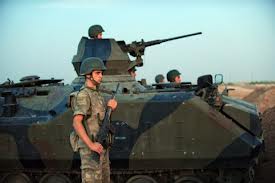 Syrian opposition activists reported a return to heavy government bombardment in major cities on Saturday, further undermining a truce intended to mark the Muslim Eid al-Adha religious holiday.
Syrian opposition activists reported a return to heavy government bombardment in major cities on Saturday, further undermining a truce intended to mark the Muslim Eid al-Adha religious holiday.
Activists in the eastern city of Deir al-Zor, the suburbs of Damascus and in Aleppo, where rebels hold roughly half of Syria’s most populous city, said that mortar bombs were being fired into residential areas on Saturday morning.
The bombardment came on the second day of a truce called by international peace envoy Lakhdar Brahimi, who had hoped to use it to build broader moves towards ending the 19-month-old conflict which has killed an estimated 32,000 people.
“The army began firing mortars at 7 a.m. I have counted 15 explosions in one hour and we already have two civilians killed,” said Mohammed Doumany, an activist from the Damascus suburb of Douma, where pockets of rebels are based. “I can’t see any difference from before the truce and now,” he added.
The Syrian military has said it responded to attacks by insurgents on army positions on Friday, in line with its announcement on Thursday that it would cease military activity during the holiday but reserved the right to react to rebel actions.
A statement from the General Command of the Armed Forces detailed several ceasefire violations in which it said “terrorists” had fired on checkpoints and bombed a military police patrol in Aleppo.
More than 150 people were killed on Friday, said the Syrian Observatory for Human Rights, a British-based opposition organisation with a network of sources within Syria.
Most were shot by sniper fire or in clashes, the Observatory said, highlighting a temporary drop in intensity of the civil war in which Assad’s forces have been conducting daily airstrikes and heavy artillery raids in most cities.
Forty-three soldiers were killed in ambushes and during clashes, it added, and state TV reported a powerful car bomb which killed five people in Damascus.
Violence had initially appeared to wane in some areas on Friday but truce breaches by both sides swiftly marred Syrians’ hopes of celebrating Eid al-Adha, the climax of the Haj pilgrimage to Mecca, in peace.
Brahimi’s ceasefire appeal had won widespread international support, including from Russia, China and Iran, President Assad’s main foreign allies.
The war in Syria pits mainly Sunni Muslim rebels against Assad, from the minority Alawite sect which is distantly related to Shi’ite Islam. Brahimi has warned that the conflict could suck in Sunni and Shi’ite powers across the Middle East.
Brahimi’s predecessor, former U.N. chief Kofi Annan, declared a ceasefire in Syria on April 12, but it soon became a dead letter, along with the rest of his six-point peace plan.
Reuters

Leave a Reply
You must be logged in to post a comment.